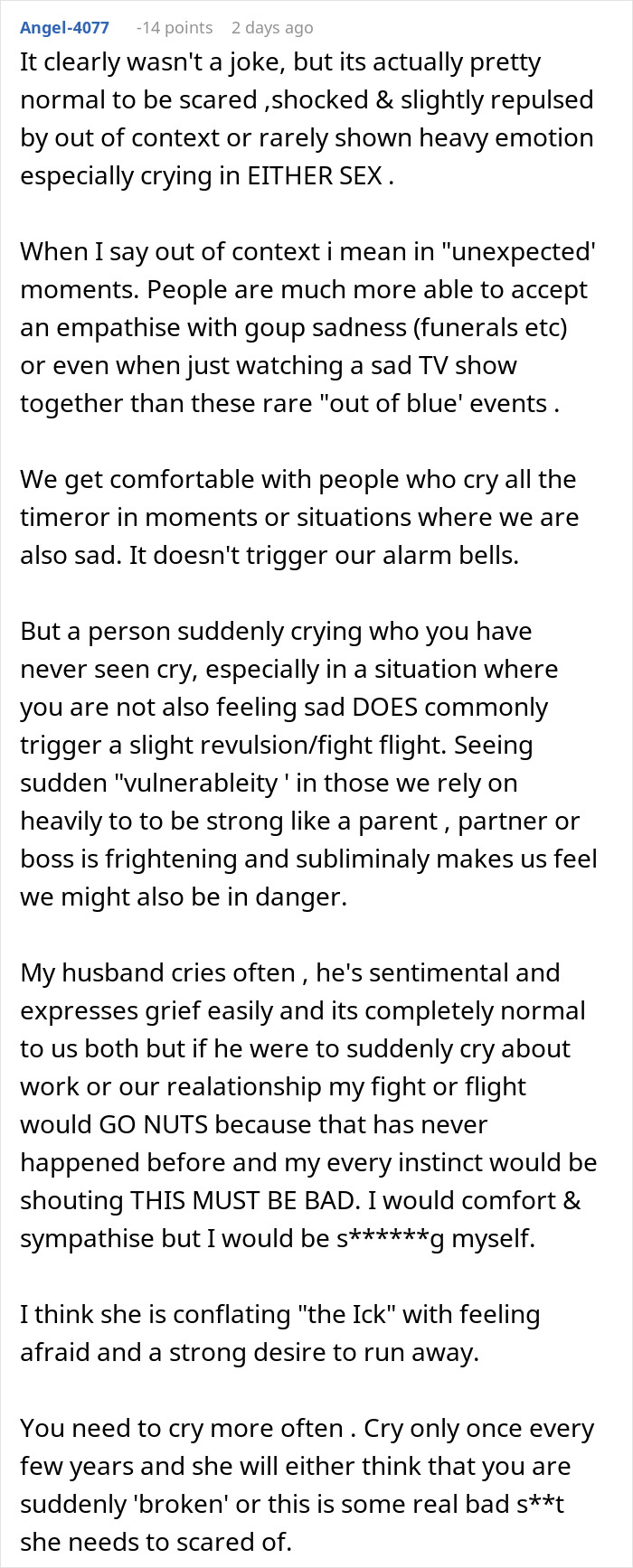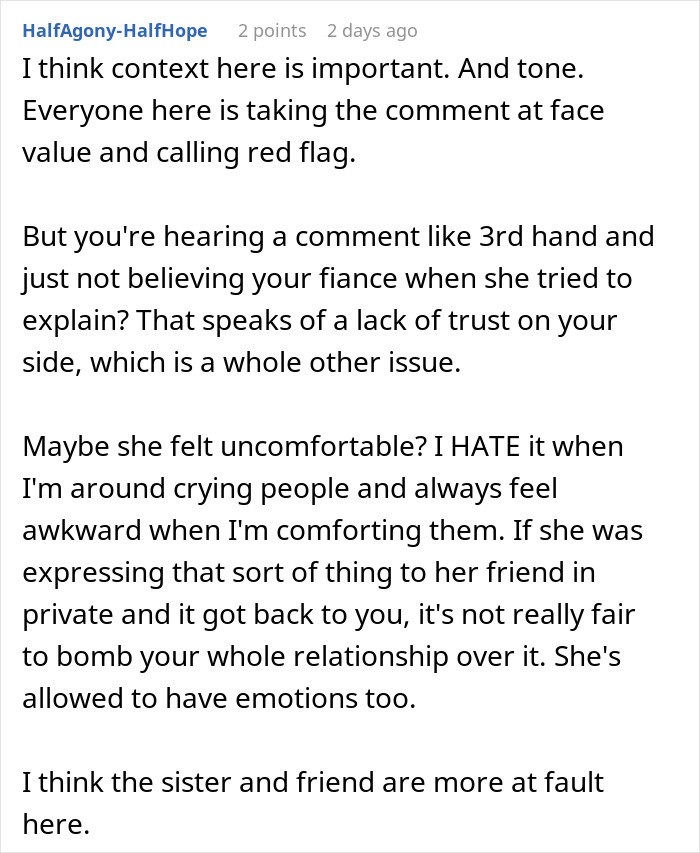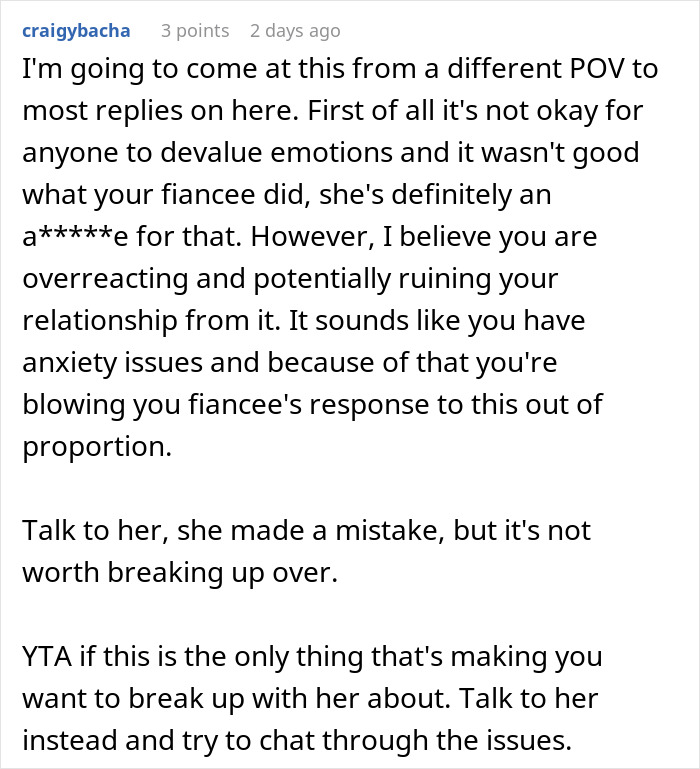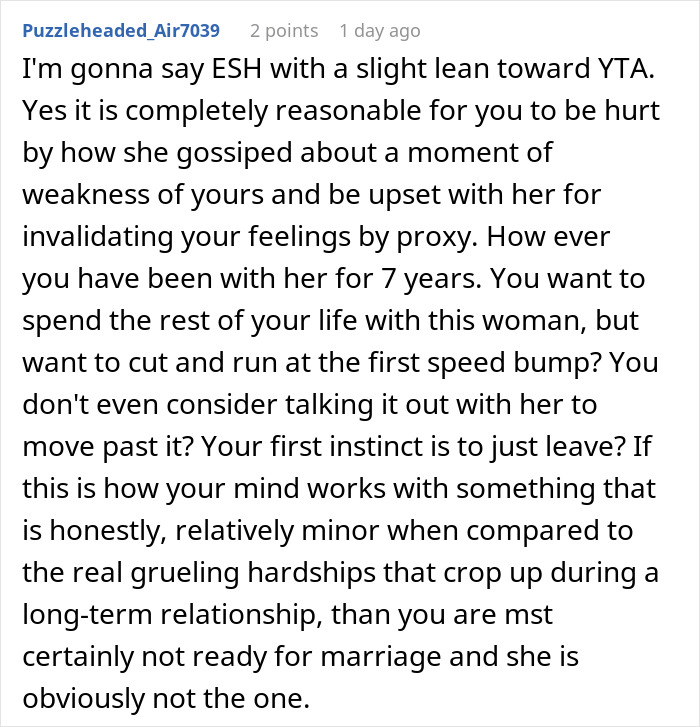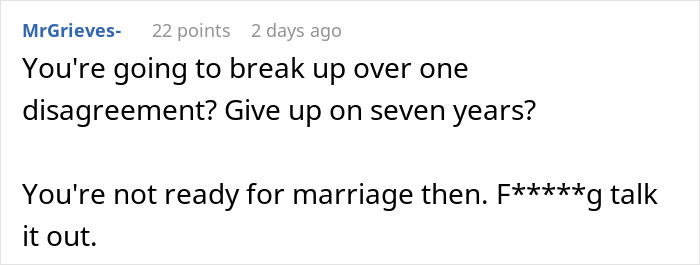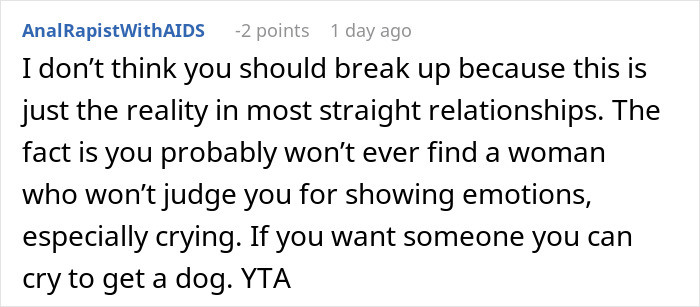When you’ve been with your partner for years and years, it can hurt to contemplate breaking up with them. However, even if you’ve been through thick and thin together, some unsavory details can come out that have you second-guessing your romantic choices. Once trust has been broken, it’s hard to rebuild.
Internet user u/LifWests went viral after asking the r/AITAH community for advice on his love life. The author opened up about how he’s reevaluating his relationship with his fiancée after the way she reacted to him being very emotionally vulnerable. Read on for the full story and the advice the internet had to share with the devastated man.
Bored Panda wanted to learn about what to do when someone is feeling overwhelmed, and how to get comfortable with emotional vulnerability, so we reached out to licensed professional counselor Rodney Luster, Ph.D. He was kind enough to share his insights with us. Dr. Luster is the host of the ‘More Than a Feeling’ blog on Psychology Today and the founder of ‘Inspirethought.’
Everyone should feel comfortable enough to be emotionally vulnerable around their partner

Image credits: dvatri / envatoelements (not the actual photo)
A man asked the net for relationship advice after finding out how his fiancée reacted to him crying in front of her






Image credits: monkeybusiness / envatoelements (not the actual photo)



Image credits: LifWests
Feeling overwhelmed indicates that our lives might be imbalanced

Image credits: LightFieldStudios / envatoelements (not the actual photo)
Dr. Luster from ‘Inspirethought’ walked Bored Panda through how someone might handle feeling overwhelmed with everything that’s going on in their life.
“Zhuang Zhou, a Chinese Philosopher from the late 4th century BC, espoused the following thought: ‘Flow with whatever may happen and let your mind be free. Stay centered by accepting whatever you are doing. This is the ultimate.’ In many ways, I believe the philosopher was illustrating the potential of letting go of our will and desire to react to events emotionally, and to simply accept and flow through them,” he shared with us.
According to the counselor, feeling overwhelmed is our mind letting us know that something is wrong with the balance in our lives. “Typically when we’re overwhelmed we may have feelings of desperation where we seek escape or avoidance as a defense mechanism. We might think of overwhelm as ‘flooded confluence.’ Or in other terms, too many things at once to process,” he explained in an email.
“So when these things happen to us we have limited cognitive defusion or an awareness of consciously stepping back to take in the entire picture. This is however what needs to happen when we feel overwhelmed is that we need to step back from the ‘picture’ of our lives.”
Dr. Luster shared a few examples of how people can do this. One approach is practicing radical acceptance of our circumstances. This allows us to take stock of reality rather than deny it. We then “accept the idea that yes the day or the circumstances are overwhelming but we are also human beings that need time and space for ourselves when we feel overwhelmed.”
Meanwhile, our self-talk is a very important aspect of our lives. It provides perspective “to not allow the shadow aspects of ourselves to criticize or to antagonize our realities. By reframing and readjusting our own self-talk we can begin to forgive the circumstance, and ourselves inside of the circumstance, and those contributing, so that we can become grounded in what we need to do.”
According to Dr. Luster, we could ask ourselves some simple questions like: “What does this situation require of me? What is it asking of me?” This way, we can consider various options, take the first step toward a solution, or realize that, in some situations, only minimal engagement is required from us.
Another way to handle feeling overwhelmed is to get out of our objective mode of thinking, Dr. Luster says. “We need to take time for ourselves even in the midst of overwhelming circumstances. This means perhaps going for a short walk, journaling, listening to music, or exercising. We need some way to move from our mode of objective thinking to more of a subjective perspective while we do something else. It’s amazing when we remove the objective aspects and allow our minds to wander subjectively that we may just come up with answers to things while we are walking or doing other things.”
Being emotionally vulnerable might feel uncomfortable at first, but it’s vital to learn to express our needs

Image credits: RDNE Stock project / pexels (not the actual photo)
Meanwhile, Bored Panda asked Dr. Luster for his thoughts on how someone can get comfortable with being emotionally vulnerable around others. He stressed that this can be tough.
“Here again, we should be practicing adopting a general acceptance of who we are and that we are not perfect, nor are the people in front of us. That notion might also encourage us to hold empathy for both parties (ourselves and the other/s) involved.”
The counselor pointed out that rehearsal can be another good way to get us comfortable with expressing our emotions and needs. “Emotions arise from needs, thus the reason we are attempting to navigate relationships. Talking with ourselves as though we were sitting in front of the person can help us reflect on how we want to articulate ourselves when it comes to expressing our emotions, allowing room to practice and think about things in a variety of ways removes added fears and can build our internal locus of control,” he explained to us.
“Rehearsal may also help circumvent any kind of physiological hijack that might occur when we are presented with situations that arise spontaneously because we have practiced our approach and dialogue around this topic. It is simply a way to get more comfortable in our own bodies when discussing emotions.”
Dr. Luster advised that when we demonstrate our emotional vulnerability, we should use personal words. For example: “I feel this way.” On the flip side, we should strive to avoid defensive language, for instance, “You’re the reason I feel this way.” This way, we allow others to see our perspective without putting them on the defensive.
The author of the viral internet story revealed that he started crying when he felt extremely overwhelmed with life and everything. Coping with emotional stress can be quite difficult, but having loved ones around you who accept and support you unconditionally is a huge plus.
According to the Cleveland Clinic, dealing with emotional stress can take as few as 5 to 15 minutes per day. Some ideas to distract yourself, calm down, and handle stress better include taking a walk, doing yoga, listening to music, dancing, singing, or simply sitting in silence with your eyes closed.
If that’s not your cup of tea, you can do other things, such as reading a book, taking a hot bath, or even lighting a candle with a soothing scent you enjoy.
Meanwhile, Verywell Mind urges emotionally stressed people to label and accurately define their emotions, practice mindfulness, meditate, do deep breathing exercises, and distract themselves with enjoyable activities.
If you’re constantly at odds with your partner, it might be time to reevaluate the relationship

Image credits: Ketut Subiyanto / pexels (not the actual photo)
There are a lot of pillars that hold up happy, healthy, and long-lasting relationships. Honesty. Openness. Trust. Good communication. Loyalty. Support. Mutual respect… And the ability to be emotionally vulnerable without fear of judgment.
Of course, no relationship is ever ‘perfect.’ Everyone makes mistakes from time to time. We all slip up and say the wrong thing, use the wrong tone, or fail to support our partners in the way that they need when they need it. But relationships are all about learning from our mistakes and doing a bit better the next time around.
In this particular case, it’s entirely up to the author how he decided to move forward. We’re all personally responsible for our emotional health and the boundaries that we enforce. And those boundaries can look wildly different for everyone.
For some individuals, knowing that their partners are put off by their crying is an instant red flag. They want to be able to be vulnerable around them.
For others, it might not be such a big deal (everyone has relationship ‘icks’), but they draw the line at gossiping and dishonesty. Still, others might not be bothered by the latter two things, and they’d laugh the entire situation off.
Again, everyone has different boundaries. But without being upfront about them with your partner, you can’t expect them to respect them. That said, if your significant other consistently ignores your boundaries on purpose, then you need to have an honest discussion with them about how their behavior affects you and what you expect.
If they’re willing to respect you and you find some sort of compromise, then there’s nothing wrong about continuing to move forward as a team. However, if they keep repeating the same mistakes over and over again, and if they chronically disrespect you, then it’s time to check in with yourself.
Are you happy? Are you fulfilled? Is there love, passion, playfulness, and fun in your life? Are you getting what you want and need from your relationship? Or are you together with your partner because you’re used to it and you’re scared of life outside the confines of your relationship?
The vital thing here is to be completely honest with yourself. Sure, every relationship is going to have its ups and downs. But if you’re constantly miserable and feel drained around your partner, it might be the perfect time to (re)discover what true happiness looks like. And that might mean remembering who you are as an individual, outside the confines of your relationship.
But what do you think, Pandas? What would you do if you were in the author’s shoes? Do you think he should break things off with his partner or try to move past the ‘ick’ conversation? We’d love to hear your take on everything. If you have a moment, share your thoughts in the comments.
The author’s story got a lot of attention online. Many netizens supported him. Here’s what they said


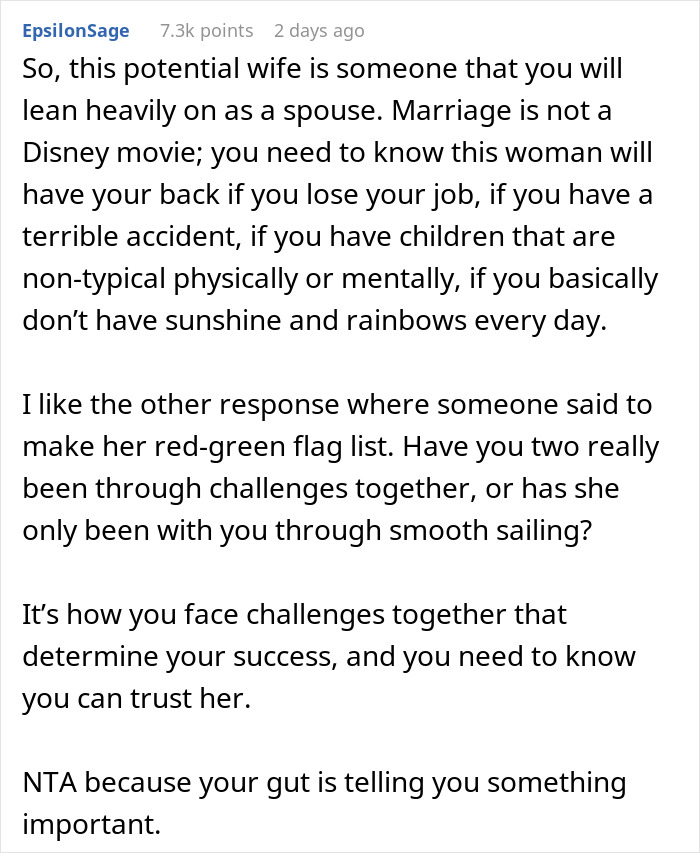





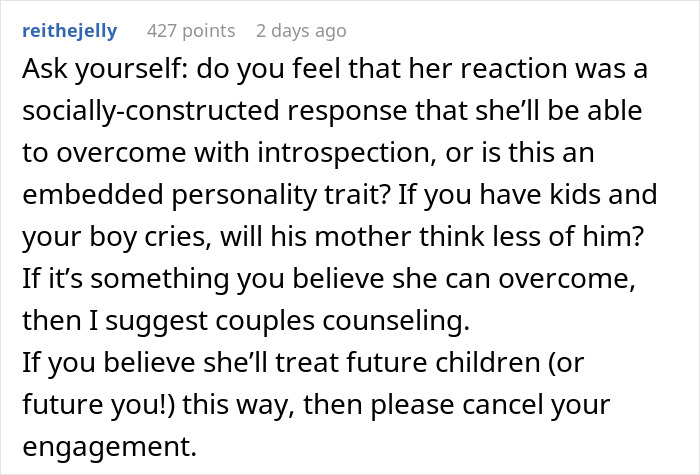

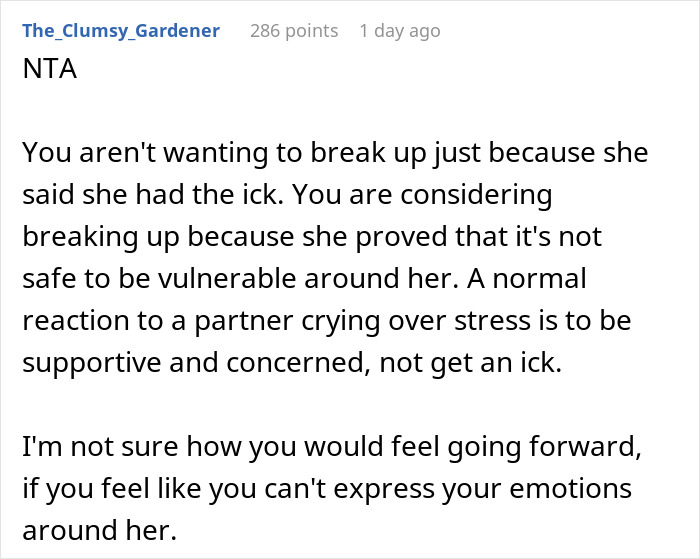
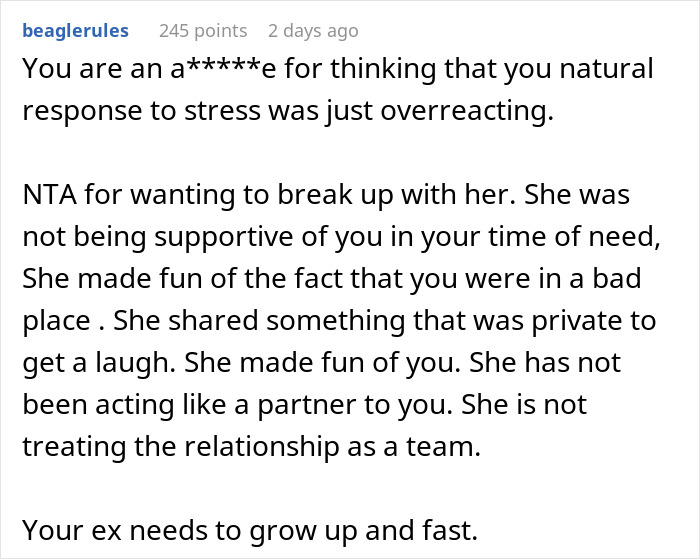
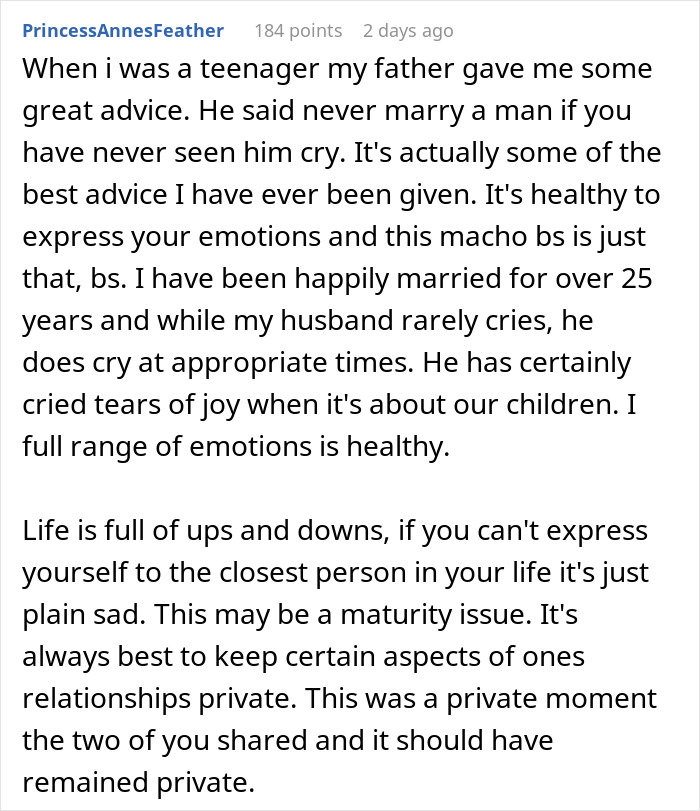
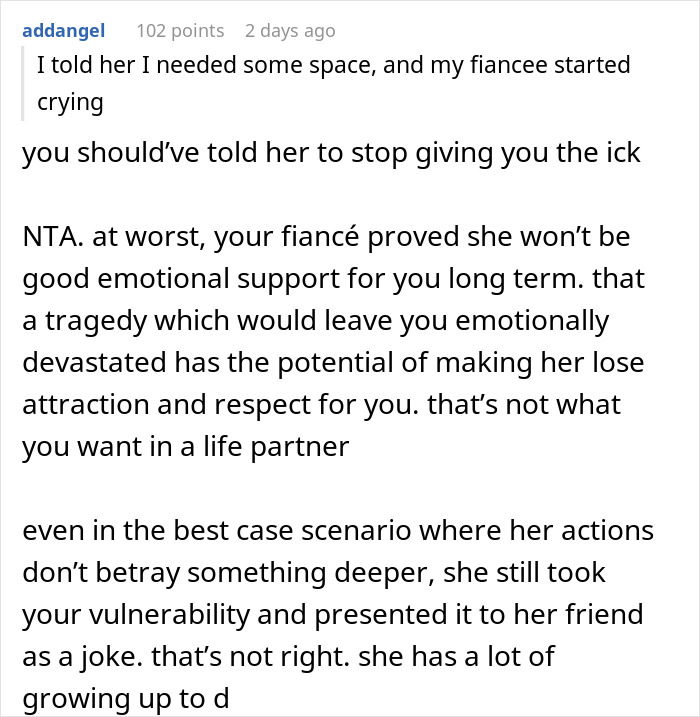

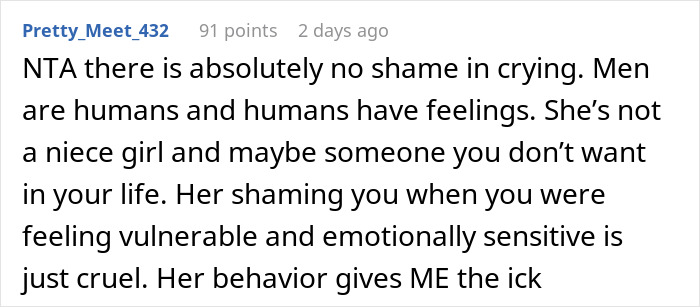








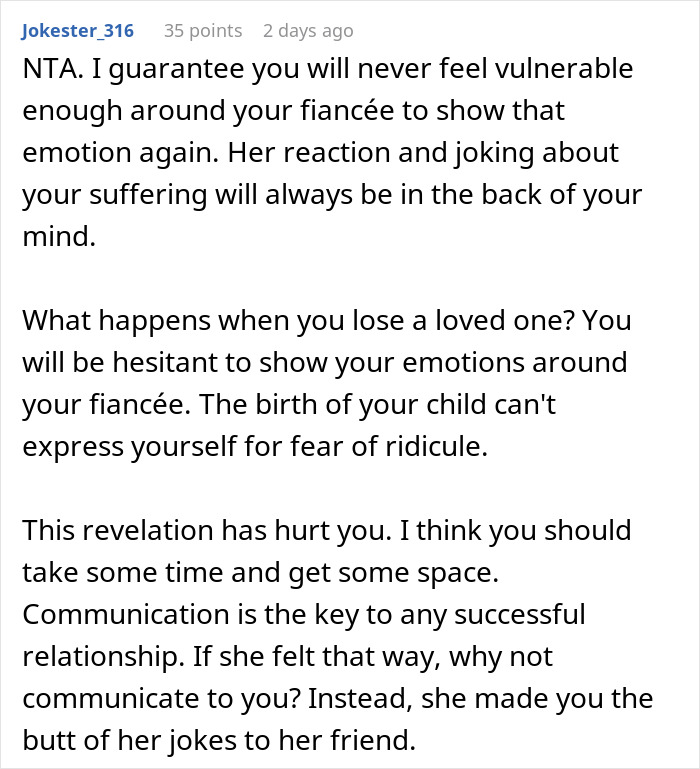
However, some readers had a different interpretation of what happened. Here are some of their reactions
